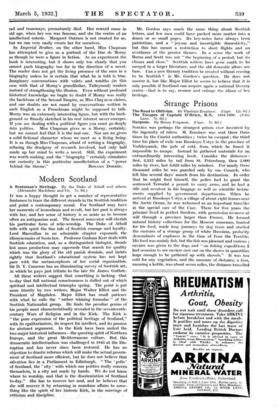Modern Scotland
A Scotsman's Heritage. By the Hake of Athol' and others. (Alexander Maelehose and Co. 7s. 6d.) IT was a happy thought to get a number of representative .Scotsmen to trace the different strands in the Scottish tradition and point a contemporary moral. For Scotland may have her moments of iconoclasm and revolt, but her past is always with her, and her sense of history is so acute a.s to become often an antiquarian zeal. The fiercest innovator will cherish his particular form of relic-worship. The Duke of Atholl tells with spirit the fine tale of .Scottish courage and loyalty. Lord Macmillan in an admirable chapter expounds the idiosyncrasies of Scots law. Professor Graham Kerr deals with Scottish education, and, as a distinguished biologist, dreads lest mass production may supersede that search for quality which was the glory of the old parish dominie, and insists rightly that Scotland's educational system has not kept pace with the metamorphosis of her social organization. Sir D. Y. Cameron has an illuminating survey of Scottish art, in which he pays just tribute to the late Sir James Guthrie.
All these writers suggest that something is lacking—that to-day that full national consciousness is dulled out of which spiritual and intellectual triumphs spring. The point is put more bluntly by two writers, Major Walter Elliot and the President of Magdalen. Major Elliot has small patience with what he calls the "rather whining formulae" of the Scottish Nationalist group. He finds the peculiar genius of his people most characteristically revealed in the seventeenth- century Wars of Religion and in the Kirk. The Kirk is "the pure expression of the political heritage of Scotland," with its egalitarianism, its respect for intellect, and its passion for abstract argument. In the Kirk have been united the two major historical influences—the questing spirit of Northern Europe, and the great Mediterranean culture. But this democratic intellectualism was challenged in 1843 at the Dis- ruption and has never since been restored. He has no objection to drastic reforms which will make the actual govern- ment of Scotland more efficient, but he does not believe that salvation lies in a Parliament in Edinburgh. "The ` polls ' of Scotland, the 'city' with which our politics really concern themselves, is a city not made by hands. We do not know where to worship, and that is the disorientation of Scotland to-day." She has to recover her soul, and he believes that she will recover it by returning in mundane affairs to some- thing like the spirit of her historic Kirk, in the marriage of criticism and 'discipline. Mr. Cordon says much the same thing about Scottish letters, and few men could have packed more matter into ti dozen or so small pages. Its key-notes have always been patriotism, and a " joyous and incorrigible domesticity," but this has meant a restriction to short flights and an avoidance of the greater themes. In a sense the work of Burns and Scott was not "the beginning of a period, but its climax and close." Scottish writers have gone south to be merged in a larger literature, and the old domestic altars are bare. Cana new literary tradition be created without ceasing to be Scottish ? is Mr. Gordon's question. He does not answer it, but like Major Elliot he Seems to believe that it is only possible if Scotland can acquire again a national literary centre—that is to say, resume and enlarge the idiom of her heritage.


















































 Previous page
Previous page